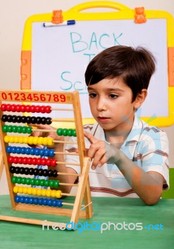
Math Help for Kids: Make it Fun
Teaching math can be challenging, as kids quickly lose interest in the lesson if they are not engaged, but it is possible to create interest and spark their appreciation for math!
Taking the Drudgery Out of Learning Math
Most Kids Think Math is Boring
Let's face it, unless kids can relate what they learn to real-life applications, they will quickly lose interest in the lesson. It doesn't help that the methods used to teach math have change drastically over the years, so most parents are at a bit of a loss when it comes to trying to offer math help to their kids. Many rules and processes have changed but one thing that's remained the same is that, when you get right down to it, beginning math required a lot of memorization and repetition.
Young kids have very short attention spans so too much repetition can cause a child to become bored and frustrated. It's difficult to take something they associate with boring repetition and create genuine interest, but all hope is not lost.
Ways to Put Fun in Math Lessons
 Although it may take some extra effort and pre-planning than what would be required for helping your child with other subjects, it is possible to create an environment where natural curiosity and appreciation for math can flourish. Kids do better with memorization and grasping concepts when they are incorporated into some sort of play. When they are engaged in a fun activity, they begin to accept ideas easily and effortlessly, without even realizing that they are doing so. Some ideas for offering math help disguised as fun and games are:
Although it may take some extra effort and pre-planning than what would be required for helping your child with other subjects, it is possible to create an environment where natural curiosity and appreciation for math can flourish. Kids do better with memorization and grasping concepts when they are incorporated into some sort of play. When they are engaged in a fun activity, they begin to accept ideas easily and effortlessly, without even realizing that they are doing so. Some ideas for offering math help disguised as fun and games are:
- Go outdoors - Just the change of pace in being outdoors is enough to invigorate a child bored with homework and the grind of learning math, but once outdoors, there are many ways to reinforce the math concepts that they're learning. Whether it's going to a supermarket and having them help calculate totals for grocery shopping or counting, then subtracting various items as you run errands and check off a To Do list, kids love any opportunity to feel helpful.
- Pretend play - Kids have great imaginations and pretend play comes very easy to them. When they are engrossed in imaginary scenarios, they are so absorbed in the story and the idea that they will easily accept whatever situation presents itself in the game. And of course, there are lots of pretend games that can incorporate math problems. Being a cashier at a store, being a math teacher, working in a bank, board games like Monopoly, or even planning a party and deciding how much to spend on decorations, food, invitations, etc. - these are all games that can easily help teach core math principles to young children without them feeling like the process is such a chore.
- Use real life people & stories - Besides you, the people your kids are usually most interested in are their friends and other close relatives. When you use math stories that contain bits of information about people they know, learning becomes a fun and silly game rather than just another boring subject that they don't understand. Setting up math problems that use their teachers, friends, family and familiar places where they play, engages the child in an enjoyable conversation that makes much more sense to them than just plain numbers and math symbols on a page.
If All Else Fails, Get Math Help
Sometimes, it may seem that no matter what you do, your child just doesn't seem to be able to conquer certain math concepts. You might feel that the math help they need is beyond what is in your ability to provide. Luckily, there are several options you can consider when seeking outside help.
Math Games For Kids : The Math Operations Game
Above All, Don't Get Discouraged
 As with most challenging problems, it's easy to throw your hands up and get very frustrated when it seems like you're banging your head against a brick wall and nothing you do appears to make a difference. But it's important to remember that even though it may seem like none of the methods you've tried for getting your child to learn math are working, but children often retain a lot more information than it originally appears that they do. It's not uncommon for them to have moments when something they've been learning for months just all of a sudden clicks and they realize that they fully understand what has been taught to them over and over again. So, in the end, helping your child with math may be a matter of doing what you can as far as using teaching aids, but then just summoning your patience and waiting it out for that moment when everything comes together exactly like it should.
As with most challenging problems, it's easy to throw your hands up and get very frustrated when it seems like you're banging your head against a brick wall and nothing you do appears to make a difference. But it's important to remember that even though it may seem like none of the methods you've tried for getting your child to learn math are working, but children often retain a lot more information than it originally appears that they do. It's not uncommon for them to have moments when something they've been learning for months just all of a sudden clicks and they realize that they fully understand what has been taught to them over and over again. So, in the end, helping your child with math may be a matter of doing what you can as far as using teaching aids, but then just summoning your patience and waiting it out for that moment when everything comes together exactly like it should.
Image Credit: FreeDigitalPhotos.net / FreeDigitalPhotos.net
Video: Making Math Fun for Kids
Shopping for Math Activities
You might also like
What's in Your Junk Drawer?Everyone has a junk drawer. It is where we put the missing caps to the marker...
First Grade Math Games - Various types Check them outIf your kid learns to love maths in the first grade, then surely there wouldn...






 Visual Learning Strategies: What to Look For in Math Learning Platformson 04/20/2012
Visual Learning Strategies: What to Look For in Math Learning Platformson 04/20/2012
 Blended Learning in the Elementary School Classroomon 04/18/2012
Blended Learning in the Elementary School Classroomon 04/18/2012
 Graphic Design Programs: Five Things You Didn't Knowon 03/27/2012
Graphic Design Programs: Five Things You Didn't Knowon 03/27/2012
 The Best-Kept Secrets of College Education: Community Colleges to Financial Aidon 03/27/2012
The Best-Kept Secrets of College Education: Community Colleges to Financial Aidon 03/27/2012



Let Us Know Your Experience with Math Help Tips/Tricks: